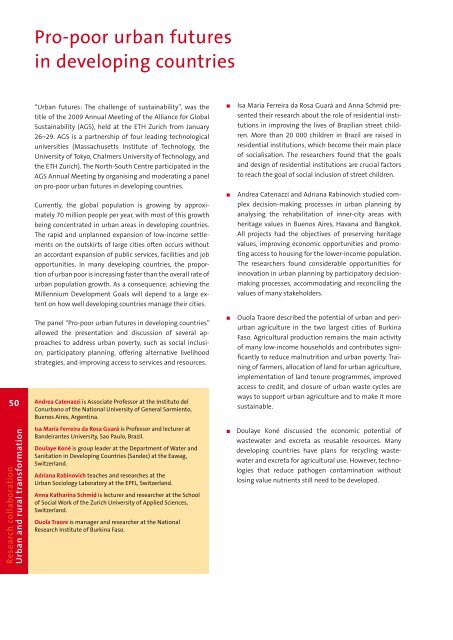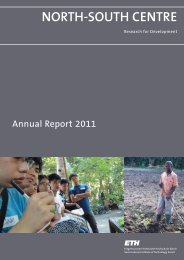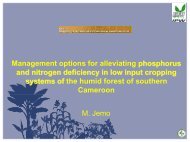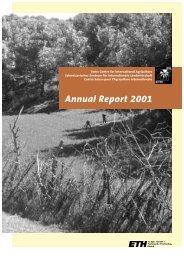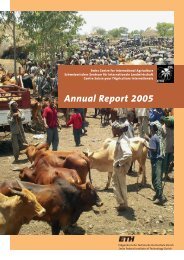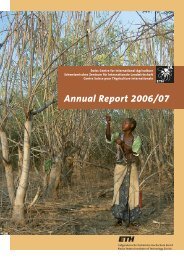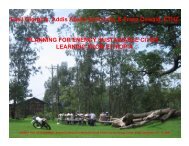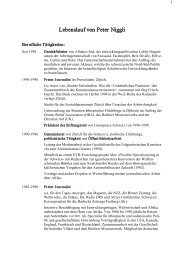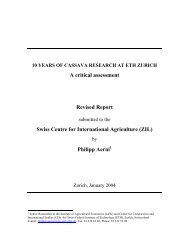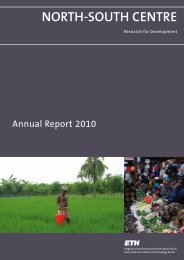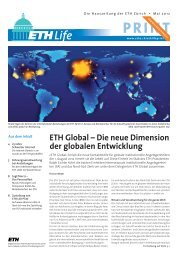NORTH-SOUTH CENTRE - ETH - North-South Centre North-South ...
NORTH-SOUTH CENTRE - ETH - North-South Centre North-South ...
NORTH-SOUTH CENTRE - ETH - North-South Centre North-South ...
Create successful ePaper yourself
Turn your PDF publications into a flip-book with our unique Google optimized e-Paper software.
Pro-poor urban futures<br />
in developing countries<br />
“Urban futures: The challenge of sustainability”, was the<br />
title of the 2009 Annual Meeting of the Alliance for Global<br />
Sustainability (AGS), held at the <strong>ETH</strong> Zurich from January<br />
26–29. AGS is a partnership of four leading technological<br />
universities (Massachusetts Institute of Technology, the<br />
University of Tokyo, Chalmers University of Technology, and<br />
the <strong>ETH</strong> Zurich). The <strong>North</strong>-<strong>South</strong> <strong>Centre</strong> participated in the<br />
AGS Annual Meeting by organising and moderating a panel<br />
on pro-poor urban futures in developing countries.<br />
Currently, the global population is growing by approximately<br />
70 million people per year, with most of this growth<br />
being concentrated in urban areas in developing countries.<br />
The rapid and unplanned expansion of low-income settlements<br />
on the outskirts of large cities often occurs without<br />
an accordant expansion of public services, facilities and job<br />
opportunities. In many developing countries, the proportion<br />
of urban poor is increasing faster than the overall rate of<br />
urban population growth. As a consequence, achieving the<br />
Millennium Development Goals will depend to a large extent<br />
on how well developing countries manage their cities.<br />
<br />
<br />
Isa Maria Ferreira da Rosa Guará and Anna Schmid presented<br />
their research about the role of residential institutions<br />
in improving the lives of Brazilian street children.<br />
More than 20 000 children in Brazil are raised in<br />
residential institutions, which become their main place<br />
of socialisation. The researchers found that the goals<br />
and design of residential institutions are crucial factors<br />
to reach the goal of social inclusion of street children.<br />
Andrea Catenazzi and Adriana Rabinovich studied complex<br />
decision-making processes in urban planning by<br />
analysing the rehabilitation of inner-city areas with<br />
heritage values in Buenos Aires, Havana and Bangkok.<br />
All projects had the objectives of preserving heritage<br />
values, improving economic opportunities and promoting<br />
access to housing for the lower-income population.<br />
The researchers found considerable opportunities for<br />
innovation in urban planning by participatory decisionmaking<br />
processes, accommodating and reconciling the<br />
values of many stakeholders.<br />
50 Andrea Catenazzi is Associate Professor at the Instituto del<br />
Conurbano of the National University of General Sarmiento,<br />
Buenos Aires, Argentina.<br />
Research collaboration<br />
Urban and rural transformation<br />
The panel “Pro-poor urban futures in developing countries”<br />
allowed the presentation and discussion of several approaches<br />
to address urban poverty, such as social inclusion,<br />
participatory planning, offering alternative livelihood<br />
strategies, and improving access to services and resources.<br />
Isa Maria Ferreira da Rosa Guará is Professor and lecturer at<br />
Bandeirantes University, Sao Paulo, Brazil.<br />
Doulaye Koné is group leader at the Department of Water and<br />
Sanitation in Developing Countries (Sandec) at the Eawag,<br />
Switzerland.<br />
Adriana Rabinovich teaches and researches at the<br />
Urban Sociology Laboratory at the EPFL, Switzerland.<br />
Anna Katharina Schmid is lecturer and researcher at the School<br />
of Social Work of the Zurich University of Applied Sciences,<br />
Switzerland.<br />
Ouola Traore is manager and researcher at the National<br />
Research Institute of Burkina Faso.<br />
<br />
Ouola Traore described the potential of urban and periurban<br />
agriculture in the two largest cities of Burkina<br />
Faso. Agricultural production remains the main activity<br />
of many low-income households and contributes significantly<br />
to reduce malnutrition and urban poverty. Training<br />
of farmers, allocation of land for urban agriculture,<br />
implementation of land tenure programmes, improved<br />
access to credit, and closure of urban waste cycles are<br />
ways to support urban agriculture and to make it more<br />
sustainable.<br />
Doulaye Koné discussed the economic potential of<br />
wastewater and excreta as reusable resources. Many<br />
developing countries have plans for recycling wastewater<br />
and excreta for agricultural use. However, technologies<br />
that reduce pathogen contamination without<br />
losing value nutrients still need to be developed.


